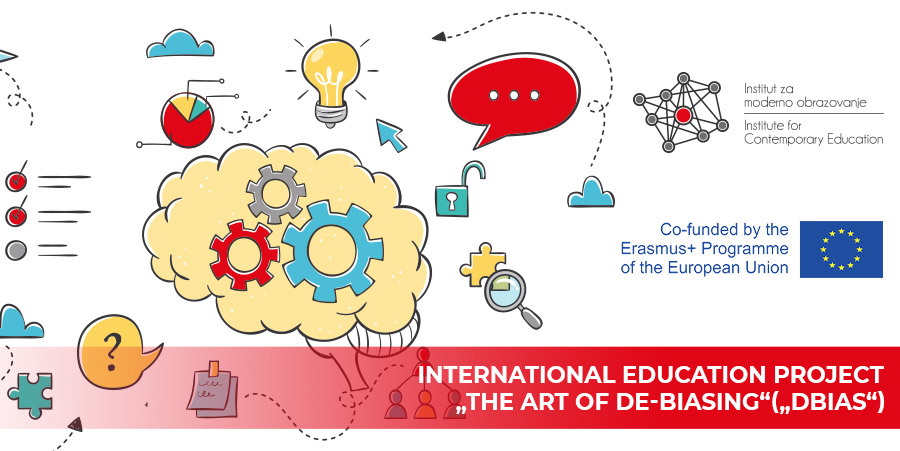
IMPORTANT STEP FOR EDUCATION: ICE and Erasmus+ bring dBias educational project to Serbia
Work on creating the first IT tools for eliminating cognitive bias in education begins
In cooperation with our partners from the UK, Bulgaria, The Netherlands, Belgium, Portugal and Turkey, the Institute for Contemporary Education (ICE) was entrusted with the realization of a three-year Erasmus+ project aimed at creating the first and only practical IT tools, strategies, and functional methodology for identifying and managing cognitive biases.
During the project The Art of De-biasing (dBias), expert teams comprising top experts in the field of education, psychologists and educators from partner countries will create an innovative, and unique curriculum, as well as functional didactic-methodological technology for professional development of teachers.
The Artevelde University of Applied Sciences from Belgium and ICE are the main engines behind the segment of the project referring to the creation of teacher training programs.
The representative of ICE in the expert team is Dr. Svetlana Belić Malinić, Academic Director of the Institute, and expert in the field of international education.
What are cognitive biases and why should every teacher be aware of them?
In the late 1970s, educational experts and analysts came to the conclusion that students have their own interpretations of social situations that arise as a result of a discrepancy between the scope of scientific and professional information which increases from one grade to another, and students’ developmental capabilities for mastering and understanding the teaching content, scientific knowledge, and concepts.
As learning is a cumulative process, each new piece of information is added to what students already know (or believe they know) about a particular topic. If the student possesses a solid base for upgrading their knowledge, new information will fit more easily into the conceptual system, and in result, the student will acquire functional, permanent and practical knowledge. However, if student’s prior knowledge is poor or incomplete, the process of acquiring new knowledge will collide with the existing misconceptions in the comprehension of the teaching material, and as a consequence, students may modify the information learned, fitting them into their framework of understanding in a wrong way, and thus creating cognitive bias.
Aware of that fact that education is increasingly faced with various challenges, and that students come to school with formed prior knowledge and certain preconceptions which are actually misconceptions, we have found ourselves in the situation that during assessment, even the best students are able to provide correct answers only with the help of words and patterns they have memorized (rote learned).
Therefore, in order for students to develop practical knowledge and understand what they are learning, and in order for teachers to achieve high teaching outcomes, the Institute for Contemporary Education and its partners on the dBias project will be developing practical solutions to completely change the manner of teaching and launch a new educational paradigm in the next three years.
ICE PROVIDES TEACHERS IN SERBIA WITH AN EXCLUSIVE OPPORTUNITY – to be the first to receive professional training for eliminating cognitive biases
In the last three decades of educational research, there have been many constructivism-inspired attempts to transform misconceptions into scientifically acceptable knowledge, but there are no ready-made generic, nor specific strategies available to teachers for practical application. In cooperation with our partners, the Institute for Contemporary Education, in addition to theoretical development, will also create the first and only practical IT tools, strategies, and functional methodology that will serve to identify and manage cognitive biases. The target group of the project comprises elementary and high school teachers, university professors, adult educators, and students above the age of 16.
Through this project, teachers in Serbia get a unique opportunity to attend professional training programs and be the first teachers in the world trained to identify cognitive biases among students. This is a revolutionary step in the field of employee training in education, and a radical shift toward a completely changed teaching model.
What will teacher training within the international project dBias look like?
In a consortium with our partners from the UK, Bulgaria, The Netherlands, Belgium, Portugal and Turkey, ICE will develop interactive video material with scenarios showing models of the most common cognitive biases, tools for assessing, identifying and eliminating biases, and other didactic materials and developmental cognitive teaching resources.
In addition, the project team will develop a network platform with an adaptive learning algorithm, through which patterns of decision-making and behavior will be collected and designed. These patterns will be used to obtain information for educational experts to discuss in focus groups, and develop educational strategies for mitigating and managing biases. The platform will enable teachers to create reports about their class, or group of students, based on which they will be able to adapt their teaching methods and activities.
Given that we currently do not have any educational strategy based on the recognition and elimination of cognitive biases, and that teachers have neither formal training nor practical tools, creating a network platform is a major step forward for the education system, because it enables teachers to become aware of students’ misconceptions and biases, and their effects on the course of content acquisition.
The key objectives of the dBias project are:
- improving teacher-student communication through increased awareness and understanding of the nature, number and effects of cognitive biases;
- creating tools for collecting data on bias-related behavior: sensitivity, resilience, effects and intensity of bias in teachers and students;
- analyzing the data collected and developing a teaching strategy aimed at eliminating biases and improving teacher-student communication;
- introducing innovative and transversal toolkits in the context of adult education and training.
Partner support
- BASH ART CREATIVE LTD, United Kingdom
- Национален учебен център, Bulgaria
- Koç University, Turkey
- Institute for Contemporary Education, Serbia
- Artevelde University of Applied Sciences, Belgium
- EduLin, The Netherlands
- DDL – Delft Digital Learning, Unipessoal LDA, Portugal
- Drawing to Health, The Netherlands
For more information, please contact us via email: office@institut.edu.rs or telephone: 011/40-11-260.


 Srpski
Srpski




